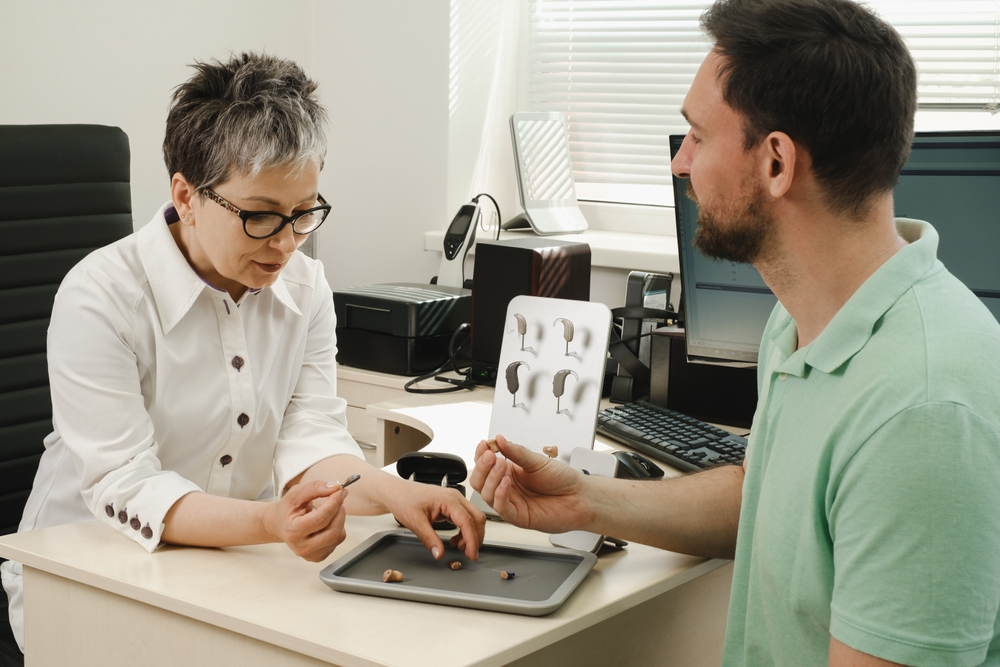So you don’t wear your hearing aids all that often. What’s the fuss about? You’ll put them in when you go out to lunch with the guys, or you have a meeting at work (if you don’t forget about them). You don’t have a lot of unplanned conversations otherwise, so your hearing aids will be fine in the drawer until you need them.
The problem is that when you aren’t wearing your hearing aids on a regular basis, you’re creating some troubling disadvantages for yourself over the long term. Your hearing could get worse. You could suffer from social isolation and cognitive decline. So, if you are not wearing your hearing aids, you should definitely be reading this.
Why aren’t you wearing your hearing aid?
If your hearing aids are sitting unused in a nightstand drawer somewhere, you likely have a reason. Sure, maybe you haven’t exactly been forthcoming about what those reasons are. Maybe, when your family asks, you even say something nondescript and evasive, like, “I just don’t like them.”
Stilted dialogue aside, we know that’s not the full story, right? If you dig a little deeper, you’ll probably find that there’s a specific complaint at the heart of your sporadic hearing aid use. Specific complaints are good because they create an opportunity to find an equally specific solution.
Some of the most frequent complaints include the following.
“My hearing aids feel uncomfortable”
One of the most commonly cited reasons that individuals stop wearing their hearing aids regularly is discomfort. Maybe the hearing aid keeps falling out of your ear. Or perhaps your over-the-ear model chafes in just the wrong spot, causing pain and tenderness.
Hearing aids aren’t supposed to be uncomfortable, so if they’re causing irritation of any kind, something is definitely wrong. And it’s understandable that you wouldn’t want to wear a piece of technology that causes soreness, pain, or frustration.
Possible solution: If your hearing aids are uncomfortable, consider scheduling an additional or follow-up fitting session. It’s entirely possible that the fit of your hearing aid just needs a couple of quick adjustments. Some models can even be entirely customized to the size and shape of your ears. The more comfortable your hearing aid is, the more likely you are to leave the device in place for long periods of time.
“My hearing aid has poor sound quality”
Maybe you don’t wear your hearing aids very often because you find the sound to be tinny or fuzzy. If that’s the case, it’s not surprising that you’ve opted to stow your hearing aids in your nightstand drawer and save them for “special occasions.”
This tinny or fuzzy sound can happen because hearing aids are performing complex auditory processes all the time, filtering out some sounds while trying to amplify others. So if your settings aren’t properly adjusted, the sound quality may seem unreliable.
Solution: There are two possible solutions to this problem: calibration and maintenance. It’s possible that your hearing aids are damaged in some form or another and need to be repaired. But it’s also possible that they just need a simple calibration (usually, this is something your hearing specialist can take care of for you).
“With my hearing aid, voices are muffled”
You want to hear your grandson’s voice with clarity. That’s the whole reason you purchased hearing aids in the first place! You didn’t want to miss one giggle. So it might be a bit frustrating if all the voices you hear with your hearing aid are muffled or hard to understand.
This usually happens when you first get your hearing aids because your ears and brain aren’t necessarily used to communicating all that well anymore (it’s like they had a falling out or something).
Solution: Practice. Your brain is going to have to get used to hearing language again, so anything you can do to help provide some repetition will help. Try reading along to an audiobook or reading along with the closed captioning while you watch NCIS. Simply having more conversations with the people around you is a great way to practice, too.
Finding solutions
The point is that no matter what your reason for not wearing your hearing aids might be, there’s a solution somewhere. And it is vital–both for your hearing health and your cognitive fitness–that you wear hearing aids regularly.
So if you’re not wearing your hearing aids? Identify the problem and find a solution, so you can make your hearing aids–and everything they help you hear–part of your daily life.



